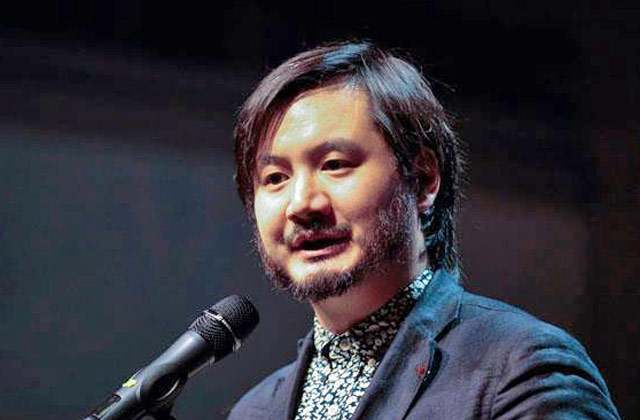Ken Chen is the executive director of the Asian American Writers’ Workshop (AAWW), which is dedicated to advancing the future of Asian-American culture through literary events, fellowships, online magazines and more. AAWW was started in 1991 by a group of organizers, novelists and poets who would be the only people of color at literary events they’d attend in New York City. The AAWW has since hosted events with writers such as Junot Díaz, Salman Rushdie and Jhumpa Lahiri. Chen joined the organization in 2008. He says he’s always been a writer, but before AAWW he was a lawyer who focused on the rights of undocumented people. In Dallas, on November 14, Chen will talk about where poetry fits into the social justice process at Facing Race, the biennial conference held by Colorlines’ publisher, Race Forward. He recently spoke with Colorlines about Asian-American identity, poetry and the power of weirdness.
What makes AAWW unique?
AAWW is dedicated to inventing the future of Asian-American culture. One way we’re different from a lot of literary organizations or Asian-American organizations is that we see how Asian-American identity can be oppositional, resistant, weird and alternative. A lot of times, racial justice programs are often about liberal accommodation like, "How can we get into the elevator to go into the hierarchy?" With [AAWW], we ask how an alternative art space can imagine a version of Asian-American identity that’s weird, that’s different, that’s avant-garde in aesthetic and radical in politics. Something [we’ve] thought about a lot is how we can use more reflective, introspective interior modes like writing, poetry and fiction, and how they can be brought into the social justice movement.
You’ve used the word "weird" a couple of times. What’s that about?
Weird? I really like the word weird. I think the point of living is to be weird, to give yourself permission to not cover yourself, to not be the person other people think you’re supposed to be. It’s a struggle because every place you go has its ways of institutionalizing you–even within social justice.
"Weird" is also a part of a slogan for this project we’re doing now called The Countercultralists. It’s about thinking of ethnic spaces not as safe spaces or corporate affinity groups but as spaces that are too weird, too illegible, too non-conformist to be assimilated into the mainstream.
What was your entry into AAWW?
I’m a writer and a poet, and I wrote a book called "Juvenilia." It’s about immigration and doomed romantic relationships. But before AAWW, I was a lawyer. I worked at a large firm but I did [a lot of] pro bono and social justice work. One project I did was to defend the asylum claims of a girl who was from Guinea. She was undocumented but didn’t realize she was not a citizen until the Department of Homeland Security stormed her house and basically abducted her and her father. The [government said] they thought she was a suicide bomber. It had elements of the immigration debate along with post 9-11 civil liberties [issues].
Most people wouldn’t relate lawyering–even pro-bono lawyering–to radical arts. How did that connection happen for you?
I’ve had a lot of different life [experiences] with [different] kinds of people. I’ve always been a writer and a poet and essayist, and it was a big shock becoming a lawyer because every time you have a job or a role, you bring with you a certain type of ideology. I think being a poet and being a lawyer are probably ideological opposites. When you’re a poet you think about your interiority, your ideas, what shape you can give to writing. It’s all in your private life. Being a lawyer is the complete opposite–the writing has no shape. If you could write like a bulldozer crossed with a math equation, then that would be the ideal writing style for a lawyer. It’s all about the public sphere of state power and so it’s really challenged me a lot in terms of what I believed as an artist. … Lawyers think about change in a very technocratic, policy-based way. But artists and activists are usually about working with communities, changing ideas–it’s less of an elite strategy. Going to law school really politicized me in a certain way. But it was the workshop that radicalized me.
